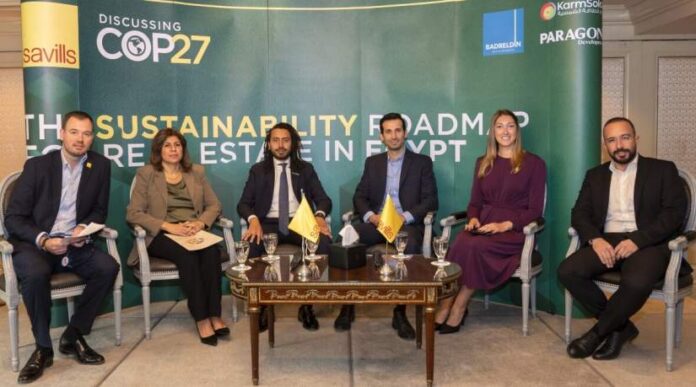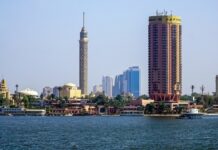Savills Egypt, one of the leading property consultants and part of Savills Middle East, hosted a panel discussion led by experts in sustainability and green energy. The focus was on the most pressing topics around the Environmental, Social, and Governance (ESG) factors, their cost, and the growth opportunities they present in the real estate industry against the backdrop of COP27 in Egypt. The real estate industry contributes to 40% of greenhouse gas emissions globally and is therefore an important sector for cities to consider when planning their paths to net zero.
The panel was moderated by Catesby Langer-Paget, Head of Savills Egypt Office and included Madeleine Velupillai, ESG Strategy Manager at Savills UK; Nada El Agizy, the Director of Sustainable Development and International Cooperation at the Leagues of Arab States; Eng. Bedeir Rizk, CEO of Paragon; Ahmad Badreldine, Managing Director of El Badr Group, and Mohamed Elsammaa, Chief Development Officer of KarmSolar.
“Egypt is following the steps of other global economies in efforts to reduce the sector’s impact on climate change. There are currently 23 LEED (Leadership in Energy and Environmental Design) certified buildings in Egypt and we can definitely foresee this number increasing in the near future, particularly in the New Administrative Capital and new cities. We are currently working with our partners on their developments – primarily commercial buildings that are currently under construction – seeking the LEED Platinum certification,” explained Catesby Langer-Paget, Head of Savills Egypt.
Madeleine, ESG Strategy Manager at Savills UK, commented, “Proptech and smart building systems, as well as renewable and low energy technologies, can all help to improve a project’s green credentials. Research, development and property technologies will be crucial in helping to reduce emissions from the built environment as cities set their sights on net zero. Construction will therefore be at the forefront of this green building revolution, with forecasting and data analytics firm Oxford Economics suggesting that global construction output could reach $15.2 trillion by 2030, up 42% from its 2020 level. The International Financial Cooperation estimates that green buildings represent a $24.7 trillion investment opportunity by 2030 across cities in emerging markets”.
Nada Al Agizy, the Director of Sustainable Development, and International Cooperation at the Leagues of Arab States, said: “We need to join forces in encouraging Arab countries to apply green building codes in order to accelerate the implementation of SDG 11, “Make cities and human settlements inclusive, safe, resilient and sustainable”, to further support the transformation of societies and institutional and urban structures towards sustainability.”
Eng. Bedeir Rizk, CEO of Paragon, said: “Paragon is one of the leading companies specialising in building administrative projects with a philosophical methodology based on human-centric approach, sustainable principles, innovation, and flexible community. Promoting real estate with a smarter sustainable design and using technology to achieve the highest standards of productivity and comfort for customers in their workplace and creating an administrative society that provides an inspiring environment for growth has become the company’s approach on the buildings.”
Mohamed Elsammaa, Chief Development Officer of KarmSolar, said: “KarmSolar’s expertise in the solar energy sector has allowed us to build multiple areas of synergy with real estate developers. Our goal for this panel is to begin the discussions on evaluating the different ways in which we can build financially feasible business models and become a true utility platform. Achieving ESG goals while positively impacting the profitability of the business is the true driver of growth and unlocking of value that the industry needs in order to increase the number of sustainably-built projects and communities.”
Ahmad Badreldin, Managing Director of El Badr Group, said: “we strongly believe that the government can play a vital role in creating incentives to encourage real estate developers to be more sustainable. At Badreldin Group, we empower communities, thrive to set market trends, and innovate urban concepts while incorporating sustainable, green, and innovative measures. For Arkan and 205 projects, we’ve provided energy efficient designs and created an internal energy efficient transport network since it became a mandate to overcome energy cost increases.”
In recent years, the government has taken economic and environmental measures that played a major role in stimulating investments, investing $324 billion to achieve sustainable development initiatives to reduce emissions and improve infrastructure. Sustainability in real estate projects implemented by the private sector has become part of the culture of most real estate developers working in the Egyptian market, which amounts to around 20% of the country’s GDP. The state has taken this approach in all cities, either by working to establish them during the recent period, or revamping existing cities that have been established decades ago.
Part of the government’s role is to facilitate the required permits for sustainable buildings and encourage the private sector to implement sustainable projects by providing strong incentives and tax exemptions. These measures will prompt developers to take serious actions towards the construction technology industry and use it in project management processes.
Savills global reach and varied initiatives help clients realise their sustainability goals. The company has established Savills Earth, a specialist department consisting of more than 80 energy and sustainability specialists that help support clients on their sustainability, energy and carbon strategies. On a local level, Savills is working with multiple stakeholders, developers and customers to achieve the goals of sustainability and climate preservation in the region. Savills Egypt participated in the Race to Zero campaign in 2021, where it pledged its full commitment to optimising processes to reach net-zero carbon emissions by 2050.
Savills will continue to lead the sustainability narrative in real estate by committing to set and achieve climate change goals alongside all partners to deliver a more sustainable future.




